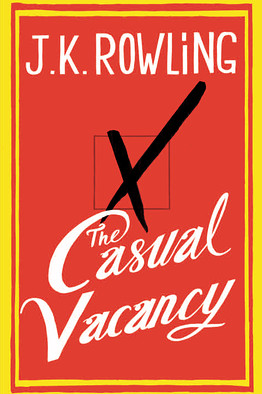September 27, 2012
J. K. Rowling’s new novel is not terrible enough
by Dustin Kurtz

J. K. Rowling‘s latest novel is hitting stores Thursday, and that means reviews are finally coming out for the closely-guarded book.
The Casual Vacancy is Rowling’s first novel meant squarely for adults — meaning it includes more sex, more drugs, more tedious local politics and a helping of class shame unsoftened by the presence of a Fourierian “sorting hat.” Early press indicates that the allusions to genitals are all a bit less obtuse as well. No “wands” here.
This, like all closely embargoed books, proves a challenge to (scrupulous) reviewers who must race to read the thing and to churn out a passable review. The Casual Vacancy, however, seems to have set the added hurdle of being almost wholly undeserving of comment.
Reviews are already online from The Guardian, The AP, The Daily News, and, most glowing, The Telegraph. The New Yorker has had their long profile of Rowling up for days now. The reviews are uniformly hurried. At least, that’s the most charitable way to explain The AP running sentences like “They’re all unhappy in one way or another, even if the only people who know that are themselves, if that.” All include the obligatory plot summary — it involves land grant politics and council estates and a nefarious baker. Some reviews are scathing, some are flattering, but what’s remarkable is that nearly all bear a tone of resignation. They write about this book because they must. Theo Talt in The Guardian is typical. His point of most unreserved praise:
The Casual Vacancy is no masterpiece, but it’s not bad at all: intelligent, workmanlike, and often funny. I could imagine it doing well without any association to the Rowling brand, perhaps creeping into the Richard and Judy Book Club, or being made into a three-part TV serial.
And from The Daily News:
It’s the teenagers then who bear the burden of making us care. And while Rowling more successfully builds drama on this front, the problem is she hasn’t much new to add to the annals of adolescent strife. Ditto on drug-infested poverty. We’ve read it before, darker, bleaker and better.
There is a temptation with blockbusters like these to bemoan the state of popular literature; Dan Brown as death knell, that sort of thing. But, hilariously, this book is not bad enough for that. It is not wonderful, it is not terrible. Its politics are questionable but Rowling means well. It may be dull and provincial, but those aren’t the capital crimes of literature. The only thing, it seems, that can be said about the book is that it is by Rowling and is decidedly not about wizards.
For those who think online reviews are too often polarized, too reductive, too prone to extremes, may we all remember this in the future: a book which, full of cutting and rape and pornography though it is, is somehow so squarely unremarkable that criticism of it is baffled, empty. It may as well have been silence. Rowling has written a koan of a book, about which all commentary is futile. And that koan, that beige “not bad at all”, remains, as of this writing, #1 in the Amazon listings.
Dustin Kurtz is the marketing manager of Melville House, and a former bookseller.